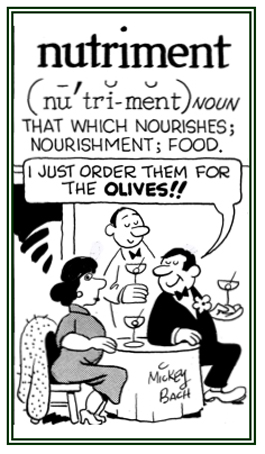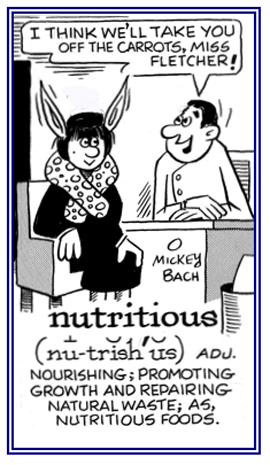nurturer
(s) (noun), nurturers
(pl)
Someone who cares for and encourages the growth or development of another person or something: Janet was a
nurturer of ethics and integrity for her children.
A nurturer is usually involved in the upbringing, education, and environment of children as contrasted with inborn characteristics that have an influence on them or the determinations of their personalities.
nutraceutical
(s) (noun), nutraceuticals
(pl)
A group of "nutrition" and "pharmaceutical" foods claimed to have a medicinal effect on human health: Such
nutraceuticals are also called "functional foods".
Nutraceutical can also be individual chemicals present in common foods.
Nutraceuticals are sold as foods for general consumption; or as "health foods" to be used as "supplements" to nutritional diets.
2. Etymology: from Latin
nutrire, "to nourish" + pharma
ceutical.
The term is applied to products that range from isolated nutrients, dietary supplements and herbal products, specific diets, and processed foods; such as, cereals, soups, and beverages.
nutrication
(s) (noun), nutrications
(pl)
The act or process of eating properly: The best
nutrication one can have is to provide energy as a developing elelment in order to help maintain or to repair body parts and to support better growth and development of one's physical structure.
The nutrication of the farmer's cows had to be properly supervised in order to ensure that they received the best possible fodder possible for the best milk.
nutriculture
(s) (noun), nutricultures
(pl)
Plants growing in nutrient solutions with or without soil medium; such as, gravel or sand to provide mechanical support: Nutriculture is a method of gardening indoors for plants that are grown in clay pebbles or in a rockwool cubes because they have an abundant supply of oxygen for their roots.
nutrient
(s) (noun), nutrients
(pl)
1. In biological energetics, food; or any substance which provides the specific elements necessary for the growth, maintenance, and reproduction of living organisms: There are countless kinds of nutrients, some of which are yolks of eggs, water, milk, flour, tapioca, cocoa, etc.
2. A substance that provides nourishment: The nutrients consist of minerals that a plant takes from the soil or the constituents in food that keep a human body healthy and help it to grow.
nutrify
(verb), nutrifies; nutrified; nutrifying
To give nourishment to the body: Mark has a program to
nutrify his physical condition by learning to watch portion sizes; especially, of fat-rich or high-fat meats, dairy products, and desserts.
Mark also nutrifies his meals by eating more whole grains, fruits, and vegetables; plus physical activities to balance his energy intake for a better life.
nutriment
(s) (noun), nutriments
(pl)
Any substance or matter that is taken into a living organism, serves to sustain it in its existence, promotes growth, and provides energy: There are various
nutriments which can be grown in the garden; for example, tomatoes, beans, and lettuce; or they can bought in the grocery store.
 © ALL rights are reserved.
© ALL rights are reserved.
Go to this Word A Day Revisited Index
so you can see more of Mickey Bach's cartoons.
nutrimental
(adjective), more nutrimental, most nutrimental
A reference to anything which is wholesome and beneficial: When Jill prepared dinner, she was aware of the nutrimental value of the food as well as having them being as delicious and colorful as possible.
nutrition
(s) (noun), nutritions
(pl)
A process of providing eatables which a living organism assimilates as food and uses it for growth and for replacement of bodily tissues: Nutrition is the science that interprets the interaction of substances that are consumed and assimilated by people regarding their growth, health, and disease.
nutritional
(adjective), more nutritional, most nutritional
A reference to substances that a person takes into the body as food and the way they influence one's health: When buying his groceries at the local store, Jack read the labels; especially, those concerning the nutritional information of the products because he didn’t want to buy anything with too much sugar content.
nutritional disorder
(s) (noun), nutritional disorders
(pl)
A condition that can be caused by deficiency, an excess of one or more ingredients, or by a toxin or poisonous element in the diet:
- An intake of food that is deficient in carbohydrates is usually deficient in proteins, too.
- An excess substances can cause obesity and dental caries which are the most common disorders in the U.S.
- Toxic effects are disorders that can arise from the presence of poisonous substances in the food which may be caused by industrial pesticides, fertilizers, pollutants, and other chemicals which can also contaminate food.
—Compiled from excerpts located in
The American Medical Association Home Medical Encyclopedia;
"Nutritional disorders"; Volume Two; Random House; New York; 1989; page 737.
nutritional value
(s) (noun), nutritional values
(pl)
Relating to a measure of the amount of energy and the maintenance of life that become available to the body from a given edible product after ingestion: There are ranking systems, developed by governments or nonprofit organizations, pertaining to the nutritional value of foods in order to inform the customers about the vitamins, minerals, dietary fiber, Omega-3 fatty acids, added sugar, etc. in foods.
nutritionally
(adverb), more nutritionally, most nutritionally
Descriptive of how food is provided or obtained which is necessary for good health and growth: Nutritionally speaking, Linda's meals were not very healthy because they consisted mainly of pasta and ice cream!
nutritionist
(s) (noun), nutritionists
(pl)
Someone who studies, or who is an expert, in the field of healthy eating: In a hospital, or nursing home, a
nutritionist is a person who plans and/or formulates special meals for patients.
Nutritionists can help patients with special needs; such as, devising healthy diets to control allergies, health problems, a desire for increased energy, or weight changes.
Some nutritionists in private practices are well-trained, hold a degree, and are licensed; however, depending on state law, a person using the title may not be trained or licensed at all.
nutritious
(adjective), more nutritious, most nutritious
1. Referring to anything containing many of the substances needed for a good life and growth: Jane loved to eat meals which were
nutritious, wholesome, and healthy because she noticed that she had more energy to do her exercises in the morning and when she was working as a secretary!
2. A description of that which provides a healthy existence for people:
Nutritious, or beneficial, substances for humans are very conducive to their physical and mental well-being.
 © ALL rights are reserved.
© ALL rights are reserved.
Go to this Word A Day Revisited Index
so you can see more of Mickey Bach's cartoons.




